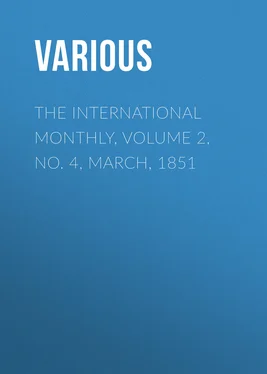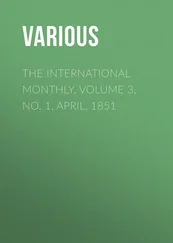Various - The International Monthly, Volume 2, No. 4, March, 1851
Здесь есть возможность читать онлайн «Various - The International Monthly, Volume 2, No. 4, March, 1851» — ознакомительный отрывок электронной книги совершенно бесплатно, а после прочтения отрывка купить полную версию. В некоторых случаях можно слушать аудио, скачать через торрент в формате fb2 и присутствует краткое содержание. Жанр: foreign_antique, periodic, foreign_edu, на английском языке. Описание произведения, (предисловие) а так же отзывы посетителей доступны на портале библиотеки ЛибКат.
- Название:The International Monthly, Volume 2, No. 4, March, 1851
- Автор:
- Жанр:
- Год:неизвестен
- ISBN:нет данных
- Рейтинг книги:5 / 5. Голосов: 1
-
Избранное:Добавить в избранное
- Отзывы:
-
Ваша оценка:
- 100
- 1
- 2
- 3
- 4
- 5
The International Monthly, Volume 2, No. 4, March, 1851: краткое содержание, описание и аннотация
Предлагаем к чтению аннотацию, описание, краткое содержание или предисловие (зависит от того, что написал сам автор книги «The International Monthly, Volume 2, No. 4, March, 1851»). Если вы не нашли необходимую информацию о книге — напишите в комментариях, мы постараемся отыскать её.
The International Monthly, Volume 2, No. 4, March, 1851 — читать онлайн ознакомительный отрывок
Ниже представлен текст книги, разбитый по страницам. Система сохранения места последней прочитанной страницы, позволяет с удобством читать онлайн бесплатно книгу «The International Monthly, Volume 2, No. 4, March, 1851», без необходимости каждый раз заново искать на чём Вы остановились. Поставьте закладку, и сможете в любой момент перейти на страницу, на которой закончили чтение.
Интервал:
Закладка:
Der Mensch im Spiegel der Natur (Man in the Mirror of Nature), is an excellent little work for popular use, by Mr. E. A. Rossmässler, published at Leipzic, in two neat volumes, with wood-cuts. It sets forth, in the most attractive form, the elementary facts of science, they being ingeniously interwoven into a narrative of the journeys, friendships, and adventures of the author. The work well deserves a translation into English.
A work of extreme interest to geologists is the Gaea Norwegica , edited by Professor Keilhau of the Christiana University, and published at that place. The first volume is just completed. No country of Europe is more important in respect of geological science than Norway, and the labors of Professor Keilhau and his associates are of the most thorough and solid kind. The volume contains 516 pages folio. Cost in America $4.50.
A German nobleman lately wrote to the French Academy, offering to give that body a yearly income of 10,000 francs to be spent in two prizes, one of 5,000 francs for the best essay in defence of Catholicism, and another of the same sum for the best essay in defence of Absolutism. The Academy declined the offer.
A System of Christian Ethics has lately been published at Regensburg, by Dr. Werner, Professor in the Catholic Theological Seminary of St. Polten. The writer holds that all virtue flows from the mystic fountain of regeneration, and is confirmed and supported solely by the sacraments of the church.
Wilhelm Meinhold, author of the Amber Witch , lately the pastor of a parish in Pomerania, is now in Berlin, preparing for admission into the Roman Catholic Church. It is not long since he forfeited his place in the Protestant Church by a street fight, for which, we believe, he was imprisoned.
The College of Rabbis, at Padua, offers 1000 florins ($400) as a prize for the best descriptive and critical work on the political and religious history of the Israelites from the first siege of Jerusalem to the time of the latest writers of the Talmud.
Mrs. Robinson's ( Talvi's ) History of the Colonization of America, originally published in the German language, has been translated by Mr. William Hazlitt, and printed in London.
Gedichte von Jeanne Marie (Poems by Jeanne Marie) is the title of one of the latest products of the German muse. The authoress is well known and well liked by those readers of German novels who take delight in the genius of authoresses, and think ladies can write as well as men. Jeanne Marie has seen much, felt much, and thought almost if not quite as much as she has seen and felt. Her poetic culture is however still defective, and her stories are better than her lyrics. The latter lack finish and correctness, and abound in mere conceits rather than in genuine poetic images. Where she attempts simply to narrate an event in the ballad style she is more successful.
A book of curious historical interest is now in course of publication in Germany, the first volume of which has already made its appearance. It is the Diary of General Patrick Gorton, who served in Russia during a large part of the seventeenth century, where he attained the highest military rank. He was in the habit of noting every thing that passed around him, or with which he was connected, whether of a political, military, or personal nature. His field of service extended throughout the entire empire, and embraced the most important events in the reign of Peter the Great. He participated in the suppression of the corps of Strelitzes, made two campaigns against the Turks, was active in Peter's reorganization of the army, &c., &c. The first volume comes down to 1678; the remainder will soon follow. As the whole was written without any design of being communicated to the world, it is especially valuable for its glimpses at the domestic habits of the country at that peculiar period.
George Sand's New Drama.—George Sand's Claudie has had a brilliant fortune at Paris, where it was first performed the second week in January. It is a drama of peasant life, in three acts, in prose. Jules Janin says of it: "The success of Claudie is a true, sincere, and energetic success. It has impassioned the calmest souls; it has calmed the most agitated. This poem is a veritable festival, full of the rustic delights of the country, of the most honorable passions of the human heart, of the noblest sentiments. Add to this, a charm altogether new, a charm both inspired and inspiring, in the style, which is reason and good sense in the most delicious costume. Neither effort nor study is there, but only that simplicity so much sought for in the most precious passages of Daphnis and Chloe translated to the Marivaux by Amyot himself. The piece was listened to with ravishment. There was universal praise among the audience, an inexpressible abundance of tears, of laughter, of gayety, of sighs, of words fitly spoken, of eloquent silence." Of the plot we take the following account from an article by Paul de Musset: From the beginning we feel the air of the country, the harvest, and the sun of August. Farmer Fauveau is preparing to pay the harvesters. His employer, Dame Rose, a young and pretty widow, has just returned from the city, where she had been for a lawsuit. Fauveau, a shrewd but good-natured man, skilfully calls her attention to the sad and agitated air of his son, who is no doubt in love with some one, and with whom can it be except his charming mistress? Dame Rose admits that Sylvain Fauveau is a handsome fellow, and a good and intelligent workman, who would manage affairs with discretion, but he would be jealous of his wife. Jealousy, replies the old man, is a proof of love, and so Dame Rose begins to cherish the idea that Sylvain is in love with her. This is not true, but the old man has said it purposely. He suspects Sylvain of being in love with Claudie, a simple laborer in the harvest field, without a penny, and gaining her living, with no other relative than a grandfather of eighty, who may any day become a charge upon her little earnings. Claudie comes in from work with her grandfather, and they ask for their pay, the harvest being finished, and it being six leagues to their home. They are paid, and Sylvain takes care that they shall receive more than his father intends, and that they shall be invited to the harvest festival. Claudie aids in the preparations, and Sylvain, reproaching her tenderly for working after a day so fatiguing, takes from her the severer part of the duties she has undertaken. But she only replies in monosyllables, and does not turn her eyes from the plates and other utensils she is engaged with. Sylvain, troubled by this, withdraws, murmuring at her coldness and indifference. We soon see the cause of this. A young peasant appears. It is the handsome Denis Ronciat, the beau and cajoler of the village girls, who utters an exclamation of surprise. A brief explanation informs us that Denis was betrothed to Claudie when she was fifteen, that he had deceived and abandoned her like a villain, leaving her a child, which had since died. This explains the gloomy air of Claudie, her indifference to the advances of Sylvain, and her almost fierce determination never to marry. To complete his outrages, Denis boldly avows his intention to marry Dame Rose, and offers money to her he has betrayed, in order to bribe her to silence. The band of harvesters appears, bearing in triumph the last sheaf, adorned with flowers and ribbons. The grandfather, Remy, full of joy, pronounces a discourse of rude and simple eloquence on the beneficence of Providence, and of the sun He causes to shine, after which a collection is proposed in favor of the orator and his granddaughter. Every one gives his offering. Dame Rose puts in a new five-franc piece, the father Fauveau a penny, Sylvain his watch, wishing that it were his heart, a child brings an apple, and finally the last contributor approaches. This is Denis Ronciat: seeing the seducer of his child, the indignation of the old man breaks out, he rejects the offering, and falls as if struck with apoplexy, pronouncing a sort of mysterious malediction, which freezes with horror all who hear it. In the second act Claudie is still at the farm, her grandfather having been sick there for two months. She has been engaged as a servant to the farmer Fauveau, but has not given the least hope to Sylvain, who has been constant in his attentions. Dame Rose, in the mean time, has fallen in love with him, and is astonished that he has not declared himself. Denis Ronciat, seeing his rival preferred, explains to the rich widow why the lover she desires will not present himself, and from vengeance and vanity divulges the secret of poor Claudie. Here we expect a storm of insults and reproaches to fall on the head of the dishonored girl. But, as in the rest of the work, the author has laid aside the ordinary traditions, customs, and conventionalities, to draw from the resources of her own genius. While all are preparing to expel the domestic who has deceived every body by her air of candor and innocence, the old man, whose reason has been wandering, listens. He recalls his recollections, and his presence of mind returns at the critical moment. He rises, throws his arms around his granddaughter, and naively recounts the story of the seduction and abandonment of Claudie: how she believed in Denis, and gave him her heart without distrust; how Denis shamefully abused her confidence, and abandoned her, when duty obliged him more than ever to be faithful. The old man adds that he himself had neither reproached nor cursed her, but that he consoled her, that he took her child upon his knees, and loved it, and despaired when it died. Finally he demands who would presume to be severer toward his child, and feel her wrong more keenly than he. His simplicity, magnanimity, and goodness, overpower all who hear him. A more gentle sentiment than even respect and pity takes possession of every heart. The devotion of the old man raises the fallen girl, and in the admiration he inspires the fault of Claudie is almost forgotten. But it is too late. The old man takes the arm of his daughter, and leads her away with him. When the curtain rises for the last scene, Dame Rose has retained Claudie and her grandfather at the house, a riot in the village having prevented their departure. Denis has come near being stoned to death. Finally he consents to repair his crime by marrying her he has betrayed. He is refused. Then Sylvain offers himself to Claudie, but she says she is unworthy of him, and refuses obstinately. Dame Rose, Fauveau, and even Sylvain's mother, try vainly to change her resolution. The old man at last decides, by saying that he reads her soul, and knows that she loves Sylvain. His authority makes her give a silent consent, and here the curtain falls. Claudie has been brought out in elegant form by a Parisian publisher. Why should not some poet attempt a version into English?
Читать дальшеИнтервал:
Закладка:
Похожие книги на «The International Monthly, Volume 2, No. 4, March, 1851»
Представляем Вашему вниманию похожие книги на «The International Monthly, Volume 2, No. 4, March, 1851» списком для выбора. Мы отобрали схожую по названию и смыслу литературу в надежде предоставить читателям больше вариантов отыскать новые, интересные, ещё непрочитанные произведения.
Обсуждение, отзывы о книге «The International Monthly, Volume 2, No. 4, March, 1851» и просто собственные мнения читателей. Оставьте ваши комментарии, напишите, что Вы думаете о произведении, его смысле или главных героях. Укажите что конкретно понравилось, а что нет, и почему Вы так считаете.












